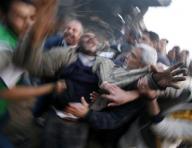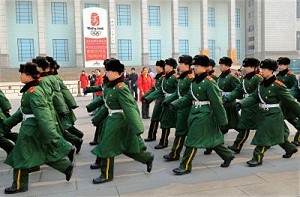This morning on Fox News Sunday, former White House adviser Karl Rove claimed that redeployment from Iraq would cause oil prices to shoot to $200 a barrel:
If we were to give up Iraq with the third largest oil reserves in the world to the control of an Al Qaida regime or to the control of Iran, don’t you think $200 a barrel oil would have a cost to the American economy?
Occupying Iraq has hardly helped oil prices stay low. Last week, oil prices reached a record high of over $102 a barrel. On March 19, 2003 — the day the Iraq war commenced — oil was trading at $36 a barrel. A look at the rise in oil prices:
None of this should have come as a surprise to the Bush administration; before the war, economists were widely predicting a prolonged presence in Iraq would lead to a rise in oil prices. As Nobel laureate Joseph Stiglitz recently noted in Vanity Fair, “The soaring price of oil is clearly related to the Iraq war. The issue is not whether to blame the war for this but simply how much to blame it.”
Rove is also out of step with the American people, a majority of whom believes that the Iraq war is tied to the current economic downturn. A recent AP poll found that 68 percent of Americans say that redeploying from Iraq would help the economy.
Transcript:
WALLACE: All right. But Obama has found a clever way to link the war in Iraq to our domestic problems with the economy here at home. Let’s watch.
(BEGIN VIDEO CLIP)
OBAMA: We are spending $12 billion per month. That is money that we could be spending here in the United States, rebuilding our infrastructure, building schools, sending kids to university.
(END VIDEO CLIP)
WALLACE: If he’s able to define Iraq in terms of where do you spend that $12 billion, on the battlefield over there or on infrastructure and social programs here, doesn’t Obama win?
ROVE: Well, Obama — it’s a good argument for Obama, but I’m wondering where it goes, because it really is a very neo-isolationist argument. It basically says, you know, We should not be involved in the world because of the consequences to the budget here at home.
Well, we were not involved in the world before 9/11, and look what happened. Look at the cost to the American economy after a terrorist attack on the homeland. We lost a million jobs in 90 days after 9/11.
If we were to give up Iraq with the third largest oil reserves in the world to the control of an Al Qaida regime or to the control of Iran, don’t you think $200 a barrel oil would have a cost to the American economy?
So you know, it’s a cute thing in a primary. I’m not certain over an 8-month general election that you can make the argument that we ought to take a look at every foreign policy commitment in the United States and measure it on the basis of the number of dollars that we’ve got there.
I happened to be in Los Angeles on Monday, and somebody had heard Obama say this to me, and they were Democrat, and at dinner they said,
I’m worried about that, because does that mean he’s going to be looking at our support, for example, for the state of Israel and looking at it in terms of what could we be doing at home with those dollars?
And it was a nice line, but I’m not certain how durable a line it necessarily is.
Source: thinkprogress.org










